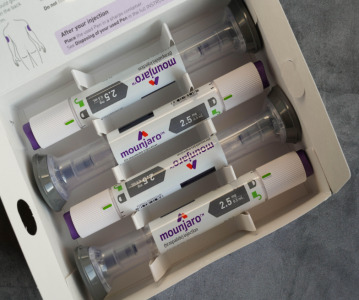FDA places clinical hold on several Phase I trials of Vadastuximab Talirine

Six patients have been identified with hepatotoxicity, including several cases of veno-occlusive disease, with four fatal events.
Seattle Genetics has received notice from the FDA that a clinical hold or partial clinical hold has been placed on several early-stage trials of vadastuximab talirine (SGN-CD33A) in acute myeloid leukemia (AML). The clinical holds were initiated to evaluate the potential risk of hepatotoxicity in patients who were treated with SGN-CD33A and received allogeneic stem cell transplant either before or after treatment. Six patients have been identified with hepatotoxicity, including several cases of veno-occlusive disease, with four fatal events.
Overall, more than 300 patients have been treated with SGN-CD33A in clinical trials across multiple treatment settings. Seattle Genetics is working diligently with the FDA to determine whether there is any association between hepatotoxicity and treatment with SGN-CD33A, to promptly identify appropriate protocol amendments for patient safety and to enable continuation of these trials.
The Phase I/II trial of SGN-CD33A monotherapy in pre- and post-allogeneic transplant AML patients has been placed on full clinical hold. Two Phase I trials have been placed on partial clinical hold (no new enrollment, existing patients may continue treatment with re-consent). These studies are SGN-CD33A monotherapy, including a subset of older AML patients in combination with hypomethylating agents, and SGN-CD33A combination treatment with 7+3 chemotherapy in newly diagnosed younger AML patients. No new studies will be initiated until the clinical holds are lifted.
Seattle Genetics’ other ongoing trials of SGN-CD33A, including the Phase III CASCADE trial in older AML patients and Phase I/II trial in myelodysplastic syndrome, are proceeding with enrollment.
Related News
-
News PSCI Welcomes Delpharm, Samsung Biologics, and Suven as First Supplier Partners
The pharmaceutical industry continues to evolve with an increasing focus on responsible sourcing, sustainability, and collaboration across the supply chain. Under a new model to recognise suppliers within the pharmaceutical and healthcare industry that... -
News Drug prices agreed upon as part of the US Inflation Reduction Act
The Inflation Reduction Act brought into constitution by the Biden administation in 2022, which proposed a drug price negotiation between the government and pharmaceutical companies, has reached it's first agreement. -
News Eisai Alzheimer’s drug authorised in UK but still faces obstacles
In partnership with BioArctic AB, pharmaceutical company Eisai has been granted Marketing Authorisation by the Medicines and Healthcare products Regulatory Agency (MHRA) for its Alzheimer’s disease drug product Leqembi. -
News Eli Lilly's weight loss drugs removed from the FDA's shortage list
The US FDA have recently updated their drug shortage list. The recently released list shows that all dosage forms of Eli Lilly's weight-loss drug Zepbound and their diabetes drug Mounjaro are now available. -
News Global advancements in the diagnosis and treatment of rare diseases: Rare Disease Day 2024
Rare Diseases Day is celebrated on the 29th February 2024 and represents the plight of rare disease patients to gain diagnosis and access to suitable treatment. -
News Pharmaceutical industry supports COP28 health stance in joint statement
As COP28 takes place over this week in Dubai, UAE, several bodies in the pharmaceutical and health industries have come together to announce support of key movements in sustainability in the sector, and to recognise sustainability as a health issue.&nb... -
News Biden backs Cold-War measures to shore-up medical supply chains
In a recent strategy to combat rising inflation and the cost of living crisis, President Joe Biden has invoked a Cold War-era act to increase investment in a selection of medicines and supplies. -
News CPHI Podcast Series: What does the changing US Pharma market mean for industry and patients alike?
In this week's episode of the CPHI Podcast Series Lucy Chard, Digital Editor for CPHI Online is joined by James Manser to discuss the political and market changes in the US pharma field.
Position your company at the heart of the global Pharma industry with a CPHI Online membership
-
Your products and solutions visible to thousands of visitors within the largest Pharma marketplace
-
Generate high-quality, engaged leads for your business, all year round
-
Promote your business as the industry’s thought-leader by hosting your reports, brochures and videos within your profile
-
Your company’s profile boosted at all participating CPHI events
-
An easy-to-use platform with a detailed dashboard showing your leads and performance


.png)




